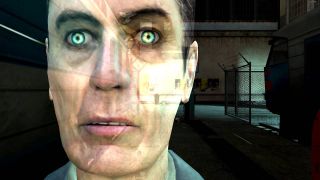'I was deranged'—Half-Life writer's regret at publishing Episode 3 story
Marc Laidlaw spent too much time on an island.

Back in 2017 Half-Life writer Marc Laidlaw published a real oddity: a wibbly-wobbly short story that was once intended as Half-Life: Episode 3. It's a weird old thing. Eli Vance is dead, Dr. Mossman tracks down the Borealis, Gordon and Alyx head off to Antarctica, and everything of course goes wrong. Laidlaw made some cursory attempts at disguise like gender-swapping characters and slightly altering their names, but it was clear this story was once intended as a resolution to a series famous for its lack of them.
Big mistake, apparently. "I was deranged," said Laidlaw in a new interview with RPS. "I was living on an island, totally cut off from my friends and creative community of the last couple decades, I was completely out of touch and had nobody to talk me out of it. [Publishing the story] just seemed like a fun thing to do… until I did it.”
Laidlaw had just retired at the time, and it's pretty clear he thought he wouldn't be working on another major Valve project. There was always a big 'lord what did I do on the internet last night' vibe about the publication, which Laidlaw put under the nom de plume of Gertrude Fremont. It begins by addressing readers as "Dearest Playa", and references being "unable to reach you by the usual means."
The writer's big regret with hindsight is causing his former colleagues any bother, and giving a false impression that this story would have been reflective of any finished Half-Life project with a '3' in the name. "Eventually my mind would have calmed and I’d have come out the other side a lot less embarrassed," said Laidlaw. "I think it caused trouble for my friends, and made their lives harder. It also created the impression that if there had been an Episode 3, it would have been anything like my outline, whereas in fact all the real story development can only happen in the crucible of developing the game. So what people got wasn’t Episode 3 at all.”
“Deranged,” said Laidlaw one more time. "There’s really no other explanation."
The interview goes over other Half-Life related ground, including the days of working out how to fit a narrative around early FPS design, and Laidlaw briefly discusses the last project he worked on at Valve, a nascent Half-Life VR game called Borealis: "very vague and diffuse."
"It’s important to say that every story we did was a thing we discovered along the way, as a team, and not as something I had an idea for and somehow drove people to execute,” said Laidlaw. "The only way to figure out the story for a Half-Life game was to make the game. There’s no reason to think a thing I put down on paper was going to bear any relation to a final product."
The biggest gaming news, reviews and hardware deals
Keep up to date with the most important stories and the best deals, as picked by the PC Gamer team.
One anecdote that's irresistible is about the singing vortigaunt players encounter in Half-Life 2, whose performance ends with a coughing fit. "That was a recording of Gabe [Newell] when he was in his Tuvan throat singing phase," said Laidlaw. "He would practice in the elevator and in the parking garage."
Well we all do things we regret, and if I had been on an island in a position to publish the episode 3 script then I probably would have too. Laidlaw's point about the treatment is the key thing though: Even if Valve had embarked upon episode 3 with this script as the starting point, whatever it ended up with would almost certainly have looked a whole lot different. There is one consolation about Laidlaw's path not taken however: You can kinda sorta play it.
Rich is a games journalist with 15 years' experience, beginning his career on Edge magazine before working for a wide range of outlets, including Ars Technica, Eurogamer, GamesRadar+, Gamespot, the Guardian, IGN, the New Statesman, Polygon, and Vice. He was the editor of Kotaku UK, the UK arm of Kotaku, for three years before joining PC Gamer. He is the author of a Brief History of Video Games, a full history of the medium, which the Midwest Book Review described as "[a] must-read for serious minded game historians and curious video game connoisseurs alike."
Most Popular






